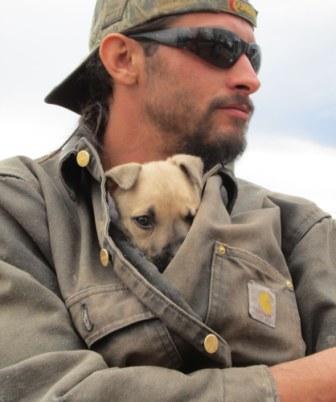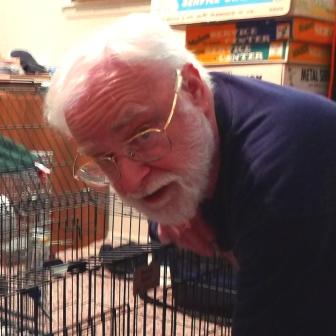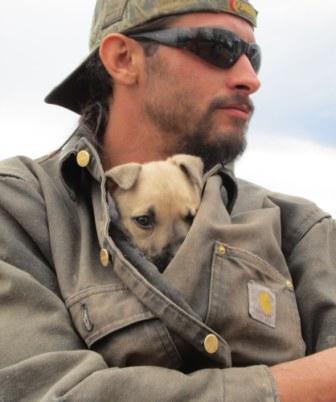
A few brave men who rescue animals
talk about macho dominance
and what it means to be a man
It’s no secret that women greatly outnumber men as animal rescuers, and even a child can tell you why. Women are naturally nurturing, caring, compassionate, as required for motherhood, whereas men are hard-wired to be aggressive, competitive, and detached, so they can be good hunters and fighters.
A century or more has gone by, however, since masculine aggression was more useful for feeding the family than causing a heart attack, and in recent decades both men and women have been shedding traditional gender roles. Today, more men than ever are nursing cute furry creatures back to health — risking ridicule and some really hurtful names.
No matter what their age or background, the men we found who are devoted to animals connect with their masculinity through responsibility, stewardship, and man’s role as provider and protector, rather than as king of the boys. Good judgment, a generous heart, and the courage to think for yourself: As one of our guys put it, that’s what makes a man.

BILL VELASQUEZ
47, Albuquerque
House Rabbit Society of New Mexico president
Bill Velasquez grew up in northern New Mexico and southern Colorado in a family with roots in ranching. He recalls that they butchered their own cows and grew their food. When he met his wife, he opposed having her rabbits in the house because he thought of them as livestock.
All that changed when the rabbits — who did end up in the house — grew ill and needed constant care. “Like with any being, you get attached to them,” he says. An electrical engineer for a construction contractor, Velasquez works in a “heavy hunting environment” where he hears killing stories daily, and has been roundly mocked for rescuing rabbits. Still, he says it doesn’t bother him that others hunt. “It’s someone else’s way of life, I’m not going to judge them for it.” His ranching background, he says, taught him tolerance for diversity.
“Everything I learned about love, I learned from the first bonded pair of rabbits,” he adds of the fragile process of rabbit courtship. “If you could just learn to love one person the way a bonded pair love each other, the world would be a better place.”
On why men are more prone to abuse animals: A lot of men think they own their animals and their wives. At one of the Albuquerque (City Council) meetings, a man came in and said, ‘I beat my wife and I beat my animals, and I’m not going to stop,’ and walked out. I don’t think he was kidding.
On changing macho attitudes toward animals: I think education is a powerful tool. When you see animals interact to where you see they feel pain or sorrow, it’s a lot harder to go out and kill them. I know people don’t agree with me. But when I’m doing the bonding (process), I’m watching the rabbits for hours, and they’re not unlike people. You can draw a lot of parallels. Rather than master animals, we’re responsible for them as stewards. Wild rabbits didn’t ask to be tamed — we bear responsibility for them.

ERIC JACKSON
44, Albuquerque
GREY2K USA vice president; Greyhound Companions of New Mexico communications director
Eric Jackson was born in England and grew up in the Chicago suburbs. Twelve years ago he and his wife moved to Albuquerque, where he teaches cognitive psychology at the University of New Mexico. A lifelong animal-lover, he got involved with greyhound rescue after adopting a retired racing dog in 2005. The more he learned about how greyhounds are raised and disposed of, the more he was driven to act. His work with the advocacy group GREY2K USA has made him a target of the dog-racing industry. “One guy made a comment about all the ‘middle-aged women’ involved. I said, ‘Look, these folks are much more than little old women you can push aside.’”
On why so few men work in animal rescue: I think it’s maybe a cultural thing, where men still aren’t supposed to show emotion — ‘for dogs,’ as I keep hearing from the industry. But then they claim the owners love their dogs. What they love is the ego extension of having a dog that can run fast. It’s like Pee Wee Baseball. I tell my classes that NASCAR grew out of bootlegging: The bootleggers would strip cars to race their product past the cops. Anytime you have two guys together, there’s going to be a race. Part of it is culture, but part of it is probably that’s how men’s brains are made. As humans, we’re badly adapted to survive, so we had to find ways to be faster. But we don’t have the need any more (to hunt), and our society, I think, is progressing.
On changing macho attitudes toward animals: I think we’ve seen it happen with dogfighting and cockfighting. A lot more of the public is saying that’s not acceptable. It’s happening now with horse racing — more people are seeing the truth behind the scenes. The more we understand, the more we see we’re not as special (as a species) as we thought. And we’re moving away from that idea of having dominion over everything.

JIM TREVER
67, Albuquerque
Prairie Dog Pals representative and outreach presenter
Jim Trever traces his interest in animals to a gift his father brought him at age 3, a stuffed squirrel from the airport. “I was just nuts about squirrels ever since,” he says seriously. He flew for the Navy during the Vietnam War, then settled in North Carolina, where he was a computer systems engineer. In 1978, Trever started rescuing orphaned and injured squirrels; 14 years ago he became a licensed wildlife rehabilitator.
Working as a civilian for the Navy for much of his career, Trever hardly fits the image of a squirrel saver, and he has taken his share of mocking from superiors and veterans. He attributes his humanitarian leanings to his father, a Methodist minister who pioneered research on the Dead Sea Scrolls. In 2010, Trever moved to Albuquerque to be near his brother, having lost his wife in a 2000 car crash. He naturally switched his allegiance to the more common, more threatened prairie dog, several of which he cares for in his Albuquerque home.
“Prairie dogs are currently at less than 2 percent of their original numbers,” he notes. “People don’t realize they have tight social bonds, so when you shoot one, you disrupt the whole community. And they don’t mate like rabbits. The female is in estrus for only five hours, once a year.”
On why men shoot prairie dogs: Man tends to think, if something’s in the way, kill it. I’ve had a lot of comments. A guy on an off-ramp rolled down his window (when Trever was rescuing dogs off a highway median) and said, ‘Too bad we can’t shoot ’em!’ I said, ‘Why?’ He was just dumbfounded. Finally he said, ‘Animal control,’ and I said, ‘That’s what we’re doing!’
On changing macho attitudes toward animals: If you get people into my classes, that will have an impact. I did the whole freshman class at Sandia (High School) in five back-to-back sessions. Afterward I had one kid tell me, ‘I’ve shot prairie dogs with 22s, and now I’m sorry.’ It’s sad, because now you can sign up for shoots online — they had one where 27,000 prairie dogs were killed in one weekend! It really worries me that these people are so callous, so desensitized. But I’ve felt this way since I was 13. At some level, all life is connected, and life should be respected.

Bill Stubblefield
64, Albuquerque
Fabulous Felines vice-president and treasurer
Bill Stubblefield’s family were ranchers in Moriarty; his father settled in the South Valley after the Navy so he could keep animals. Bill went on to study English at Stanford University in the 1970s, then got his graduate degree in computer science to pursue an interest in artificial intelligence. That’s where he met his wife, Merry, also a computer scientist.
Merry was into cats, and eventually became an animal-rights attorney. When her cat collection got unmanageable, she started Fabulous Felines no-kill cat rescue in 2006. Observing their five house cats, Bill naturally got to pondering how animals think, and “I got disillusioned by rationalist models of thinking. That got me on quite a long journey.”
After retiring from Sandia Labs in 2011, where he was a computer scientist, Stubblefield turned his energies to writing (novels and poetry, as well as his blog, wmstubblefield.com), playing jazz guitar, and restoring their Foothills home. He continues to study human and animal relationships, and has concluded that animals have a different, not necessarily inferior, type of intelligence.
On the ranching ethic: It does seem a little paradoxical, coming from ranching folk, but I am a vegetarian and a little bit of a pacifist. I don’t like killing. My dad was a hunter, yes, he ate meat, but he also taught me to care for animals and to build things. I still have the ethos that animals come first. I remember I would come home from school tired, and my dad would say, ‘Feed the animals first, then you can rest.’ Or in the morning, thaw the water and then eat breakfast. I see the deeper ethos of responsibility — this is a ranching ethos — that you sleep, you eat, only when the animals have been cared for.
On how to change macho attitudes toward animals: I think it is changing. We do have this image of men (as fighters), but why can’t it be an image of men as creators? My heroes have always been the poets, the architects, the musicians — people who looked at the world and, rather than use weapons to subjugate, say, ‘I’m going to build something.’ We do it by living our lives. I don’t think persuasion works that well; example is more important. Try to build an image of man as creator, builder, protector. That’s a man.

BILL WOLDMAN
67, Corrales
Friends of Corrales Animal Shelter (FOCAS) president; CARMA (animal rescue) volunteer
Bill Woldman comes from New Jersey, but has lived nearly two decades around Albuquerque with his wife, Barbara Bayer, who founded CARMA in 1999. She rescued cats before there was a name for it; he grew up without pets. On their first date, Woldman’s future wife made it quite clear that, next to her four cats, he would always be No. 5.
A former bagel shop owner who is now Albuquerque field representative for Sen. Tom Udall (D-N.M.), Woldman is the political force behind the successful 2011 drive to make Corrales the first no-kill community in New Mexico. He also helped spearhead the ongoing effort to develop a municipal animal sanctuary in Corrales. “Initially I just tagged along,” he says of the couple’s work for animals, “but her passion rubbed off on me. There’s so little (in this world) we can have an impact on.”
On why men are more prone to abuse animals: Maybe it’s a substitute for abusing women — or a step toward it. But it’s not just about animals. Men in this country are insecure. In the ’70s, things were moving along, and then came the ’80s. …I equate it a lot with our military strength and isolationism. Maybe it’s subliminally political: ‘You can’t let your guard down,’ etc.
On changing macho attitudes toward animals: What may change it is returning soldiers, and the bond they can make with dogs — at least on the dog side. Whether it’s with prisoners, or the disabled, or soldiers, it is a stepping stone.

GABE GARCIA
31, Albuquerque
Watermelon Mountain Ranch staff; New Mexico Dogs Deserve Better volunteer
Gabriel Garcia was born and raised in the South Valley. As a kid he had a soft spot for animals, and paid the price by having to witness a lot of animal abuse — as well as take his own share of thrashings. “My dogs were always there,” he recalls. “I could deal with dogs better than people.” Dogs would follow him home; he was the type to “find” animals in trouble. He even found a puppy in the bathroom at Zia Elementary, and convinced his father to let him keep it.
Recently Garcia spent five years on staff at Watermelon Mountain Ranch animal rescue, and now contributes what is needed at New Mexico Dogs Deserve Better, from fence-building to dog walking. He says NMDDB’s outreach missions — where women offer blankets, toys, and support for chained dogs — have restored his faith in humanity. “Even the toughest guy, it opens them up, because you’re giving them stuff. Sometimes they even start helping to clean the yard.”
On witnessing animal abuse: My older brother and his friends did have dogfights in semi trailers. I saw one, and it turned me completely the opposite. When I was younger I’d get into it (with them), but now I just call the authorities. I have gotten my brother and his friends completely turned around, after giving them a hard time for years, telling them not to be such bastards.
They do enjoy it. That’s what their parents did, that’s what they knew. It’s different with working dogs (on a ranch) — they need them. Here in the city, they’re just lawn ornaments.
Sometimes when you get a puppy, they’re really cute, but they never train them, and then that’s the only place they can go (chained in the yard). It’s a mindset, a lifestyle. They’re shady people and they need someone to protect them.
I never felt I needed a dog to protect me — I protect dogs.
On how to get people to stop abusing dogs: To see what Angela (Stell, of NMDDB) and her group do, to see some of the dogs rehabilitated — that might help, to see them be good dogs. Because any dog can be a good dog. It’s all in how you treat them.
